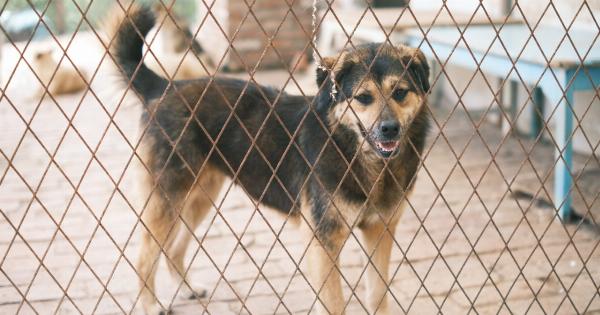Many dog owners may have experienced the perplexing situation of having a dog with a constantly angry demeanor. This behavior can be concerning, and it is important to understand the underlying reasons behind your dog’s anger.
In this article, we will explore some common causes of a dog’s angry demeanor and provide insights into how to address this issue effectively.
The Importance of Recognizing Your Dog’s Body Language
One of the crucial aspects of being a responsible dog owner is learning to read and interpret your dog’s body language. Dogs communicate their emotions primarily through their body postures and facial expressions.
By understanding your dog’s body language cues, you can gain valuable insights into their emotional state, including anger.
Factors Contributing to Your Dog’s Anger
There are several potential reasons why your dog may display a constantly angry demeanor. It is essential to consider these factors and address any underlying issues to help your dog lead a happier, more balanced life.
1. Lack of Socialization
Dogs that have not been adequately socialized during their critical developmental period may exhibit signs of aggression or anger.
When dogs are not exposed to a variety of people, animals, and environments during their early months, they may feel threatened or insecure in unfamiliar situations, leading to anger and defensive behavior.
2. Previous Traumatic Experiences
Dogs that have experienced trauma or abuse in their past may develop aggressive tendencies as a defense mechanism.
Traumatic experiences can leave lasting emotional scars on dogs, causing them to distrust humans or other animals and respond with anger as a protective response.
3. Fear and Anxiety
Fear and anxiety are common triggers for anger in dogs. Phobias, separation anxiety, and fear of specific situations or objects can all contribute to a dog’s constant anger.
It is crucial to identify the sources of fear and anxiety and work on desensitization and counterconditioning techniques to alleviate these emotions.
4. Health Issues
Pain or underlying health conditions can also manifest as anger in dogs. If your dog is experiencing discomfort or physical pain, their irritability and anger may be a response to their physical distress.
It is essential to consult with a veterinarian to rule out any potential health issues that may be contributing to your dog’s anger.
5. Lack of Proper Training
Dogs require structured training to learn appropriate behavior and to develop good social skills. Without proper training, dogs may resort to aggressive or angry behavior as a way to communicate their needs or establish dominance.
Consistent and positive training methods can help address and modify these behaviors effectively.
6. Unmet Physical and Mental Stimulation Needs
Dogs are active and intelligent animals that require regular physical and mental stimulation. When their needs are not met, they may become frustrated and express their anger through destructive behavior or aggression.
Providing your dog with ample opportunities for exercise, play, and mental stimulation can significantly reduce their constant anger.
Addressing Your Dog’s Constant Anger
Dealing with a dog’s constantly angry demeanor requires a multi-faceted approach that addresses the underlying causes effectively. Here are some strategies to help you manage and modify your dog’s anger:.
1. Consult with a Professional
If your dog’s anger is severe or persistent, seeking guidance from a professional, such as a certified dog trainer or animal behaviorist, is highly recommended.
They can assess your dog’s behavior, identify the root causes, and design a tailored behavior modification plan.
2. Positive Reinforcement Training
Training your dog using positive reinforcement techniques can have a significant impact on modifying their behavior.
Reward-based training helps reinforce desired behaviors and teaches your dog alternative ways of expressing themselves, reducing their anger and aggression.
3. Gradual Exposure to Triggers
If your dog’s anger is triggered by specific situations or objects, gradually exposing them to these triggers in a controlled and positive manner can help desensitize them over time.
This process, known as systematic desensitization, should be done under professional guidance to ensure safety and effectiveness.
4. Addressing Health Concerns
It is crucial to rule out any underlying health issues that may contribute to your dog’s anger. Regular visits to the veterinarian and monitoring your dog’s overall well-being can help detect and address any health concerns promptly.
5. Providing Mental Stimulation
Enriching your dog’s environment with interactive toys, puzzles, and training exercises can help occupy their minds and redirect their focus away from anger.
Mental stimulation not only keeps them engaged but also helps tire them out, reducing the likelihood of anger-related behaviors.
6. Implementing Consistent Routine and Boundaries
Dogs thrive in environments with clear routines and consistent boundaries. Establishing regular feeding, exercise, and sleep schedules, along with setting appropriate rules and limits, can help your dog feel more secure and reduce their anger.
The Benefits of Resolving Your Dog’s Constant Anger
Addressing your dog’s constant anger not only improves their quality of life but also enhances the overall bond between you and your furry companion.
A happier and calmer dog is more likely to exhibit affectionate and obedient behavior, fostering a positive relationship based on trust and understanding.




























